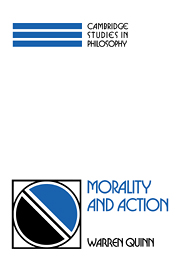Book contents
- Frontmatter
- Contents
- Acknowledgments
- Introduction
- 1 Moral and other realisms: Some initial difficulties
- 2 Abortion: Identity and loss
- 3 The right to threaten and the right to punish
- 4 Reply to Brook
- 5 Truth and explanation in ethics
- 6 Reflection and the loss of moral knowledge: Williams on objectivity
- 7 Actions, intentions, and consequences: The Doctrine of Doing and Allowing
- 8 Actions, intentions, and consequences: The Doctrine of Double Effect
- 9 Reply to Boyle's “Who is entitled to Double Effect?”
- 10 The puzzle of the self-torturer
- 11 Rationality and the human good
- 12 Putting rationality in its place
2 - Abortion: Identity and loss
Published online by Cambridge University Press: 05 June 2012
- Frontmatter
- Contents
- Acknowledgments
- Introduction
- 1 Moral and other realisms: Some initial difficulties
- 2 Abortion: Identity and loss
- 3 The right to threaten and the right to punish
- 4 Reply to Brook
- 5 Truth and explanation in ethics
- 6 Reflection and the loss of moral knowledge: Williams on objectivity
- 7 Actions, intentions, and consequences: The Doctrine of Doing and Allowing
- 8 Actions, intentions, and consequences: The Doctrine of Double Effect
- 9 Reply to Boyle's “Who is entitled to Double Effect?”
- 10 The puzzle of the self-torturer
- 11 Rationality and the human good
- 12 Putting rationality in its place
Summary
Most philosophers who discuss abortion seem to presuppose that during any period of time in which a human fetus is not yet a human being abortion remains a matter of negligible moral consequence. The extreme antiabortionist, of course, denies that there is any such period; but he too seems to accept the presupposition. For he argues as if everything depended on establishing conception as the point at which human life begins. The extreme proabortionist relies on the same presupposition. It enables him to move from the premise that no fetus ever fully qualifies as a human being to the conclusion that abortion at any fetal stage is permissible on demand. Even moderates are generally so classified because they take some intermediate point in pregnancy (for example, viability) to be the beginning of human life, and hence to be the moral watershed at which abortion begins to be objectionable. Thus all parties to the debate as traditionally conducted seem to regard the fetus itself as entering the moral drama in only one of two ways: either as a mere mass of cells which can be excised at the pregnant woman's discretion or as a human being with a full right to life of the very sort possessed by those who ponder its fate.
But this presupposition may be false. At least it is at odds with two intuitions I have long found persuasive: (1) The first of these is that even a very early abortion stands in need of moral justification in a way that the surgical removal of a mere mass of tissue does not.
- Type
- Chapter
- Information
- Morality and Action , pp. 20 - 51Publisher: Cambridge University PressPrint publication year: 1994
- 1
- Cited by



